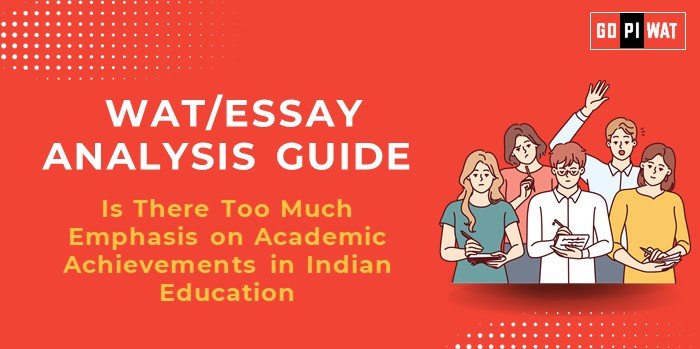📋 WAT/Essay Analysis Guide: Is There Too Much Emphasis on Academic Achievements in Indian Education?
🌟 Understanding the Topic’s Importance
India’s education system has long prioritized academic achievements as a benchmark for success. While this focus drives global competitiveness and literacy, it also raises concerns about student well-being, skill gaps, and holistic development. For B-school students, addressing this issue is crucial for developing policies that nurture well-rounded professionals for a dynamic economy.
🕑 Effective Planning and Writing
- 📝 Time Allocation:
- Planning: 5 minutes
- Writing: 20 minutes
- Review: 5 minutes
- 💡 Preparation Tips: Focus on balancing achievements with challenges and include global comparisons for depth.
✍️ Introduction Techniques for Essays
- ⚖️ Contrast Approach: “While Indian students excel in global competitions, a lack of soft skills and creativity raises questions about the overemphasis on academics.”
- 📜 Historical Lens: “India’s education system, rooted in colonial structures, has prioritized academic rigor. Yet, the modern economy demands a shift toward holistic learning.”
🏆 Structuring the Essay Body
✅ Achievements
- 📚 Improved Literacy Rates: India’s focus on academics has contributed to higher literacy levels and educational access.
- 🎓 Global Competitiveness: Indian students excel in STEM fields, contributing to a strong global presence in engineering, medicine, and technology.
- 🏫 Higher Education Growth: Academic rigor has fueled enrollment in prestigious institutes like the IITs and IIMs.
⚠️ Challenges with Comparative Analysis
- 🧠 Skill Gap: Heavy focus on academics has led to a lack of critical skills like problem-solving, communication, and innovation.
- 😟 Mental Health Concerns: Academic pressure contributes to stress, anxiety, and student burnout.
- 🌍 Global Comparisons:
- 🇫🇮 Finland: Emphasizes a holistic education model that integrates academics, skills, and creativity, resulting in happier, well-rounded students.
- 🇯🇵 Japan: Combines academic rigor with life skills training, balancing academic performance and personal growth.
🚀 Future Outlook
- 📖 Introduce curriculum reforms that emphasize life skills and creative thinking alongside academics.
- 🔄 Promote flexible assessment models that focus on competencies instead of rote learning.
- 👨🏫 Invest in teacher training to support holistic student development.
🔚 Concluding Effectively
- ⚖️ Balanced Conclusion: “While academic success forms the backbone of India’s education system, integrating soft skills and skill-building will create well-rounded professionals ready for a dynamic job market.”
- 🌍 Global Comparison Conclusion: “Countries like Finland and Japan demonstrate that a balanced education system can produce innovative thinkers without sacrificing academic excellence.”
📊 Analyzing Successes and Shortcomings
- ✅ Key Achievements:
- Higher global competitiveness in STEM fields.
- Improved literacy and increased higher education enrollments.
- ⚠️ Ongoing Challenges:
- Limited focus on creativity and soft skills.
- High mental stress and pressure on students.
- 🌐 Global Context:
- Finland: A balanced focus on academics, arts, and life skills.
- Japan: Incorporates moral education and practical skills alongside academics.
🚀 Recommendations for Sustainable Progress
- 📚 Curriculum Reforms: Incorporate mandatory life skills and soft skills training.
- 📝 Flexible Assessment Models: Shift toward competency-based evaluations to reduce rote learning.
- 👨🏫 Teacher Training: Equip teachers to foster holistic development beyond academics.
✍️ Sample Short Essays on the Topic
⚖️ Balanced Perspective
“While academic achievements form the backbone of India’s education system, the rising skill gap and student stress highlight the need for a balanced approach that values holistic development.”
🔧 Solution-Oriented
“Addressing the overemphasis on academics requires introducing soft skills training, fostering creative thinking, and reducing exam-centric pressure through competency-based learning.”
🌍 Global Comparison
“Countries like Finland and Japan demonstrate that balancing academics with skills development produces happier, well-rounded students. India must adopt a similar model to prepare youth for the 21st-century economy.”


